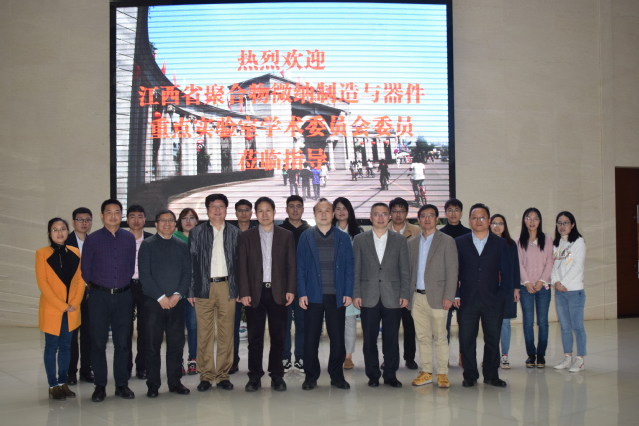Key Laboratory of Polymer Micronanofabrication and Devices originated from Advanced Polymer Materials and Processing Research Team in 2014. It was co-constructed by East China University of Technology, Nanchang University, and Shangrao Normal University, and then was successfully entitled as Jiangxi Prestigious Technological Innovation Group. In 2016, based on the Technological Innovation Group and Jiangxi key discipline, the research team was renamed as Jiangxi Key Laboratory of Polymer Micronanofabrication and Devices. Currently, the lab has 42 researchers, some of whom have been honored nationally or provincially.
Research Focus
Our lab emphasizes the key scientific issues, technological development and instrument manufacturing in the fields of Innovatively Chemical Preparation of Polymer Composites, Development of Bio-macromolecular Polymers, Applications of Micro-nano Materials and Polymers and Their Derivatives in Energy Devices and Photoelectric Converters to fit the National Strategic Planning for the Development of Emerging Industries. The research focuses aim to foster the sustainable development of polymer micro-nanofabrication, energy and optoelectronic devices, offering technological support to local economy and social development. Then, our research focuses will be briefly introduced as follows,
1. Innovatively Chemical Preparation and Application of Polymer Composites
In view of the abundant biomineral materials in nature, such as pearls, corals and shells, biomimetic composites with special morphology, specific orientation, multi-level structure and excellent mechanical properties are constructed. The functional modification of polyolefin products improved the polarity of its surface, improving the dyeing and printing properties of polyolefin, as well as the compatibility and adhesion with other materials. The applications of polyolefin in catalyst carrier, medicine, optoelectronic materials, biological materials and environmental protection were expanded.

2. Application of Bio-macromolecular Polymers
Studies on sugar chain response polymers and DNA coding compound library are conducted in this field. As sugar chains on cell surface are closely connected with the occurrence and development of tumors and cancer, capturing and analyzing the dynamic change of sugar chain is vital to the research on cancer mechanisms, early diagnosis, and development of targeted inhibitors. However, the analysis of glycosylation meets the problems of relying too much on High Resolution Mass Spectrometry as well as time-consuming and laborious sample pretreatment, our research aims to achieve the simple, fast and effective detection and analysis of sugar chains, even decoding of structural identification sequences to overcome the listed problems. What is more, DNA coding compound library as a faster and cheaper technology for inventing new drugs, aims to develop more new reactions for DNA coding compound library for dealing with the constraints that molecular diversity in the library is limited by chemical reactions.
3. Applications of Polymers and Their Derivatives in Energy Devices
In light of the deficiencies in battery devices, our lab aims to develop advanced materials for high efficiency energy devices, especially inorganic-polymer composite conductors, water-system batteries, polymer electrolytes, all-solid-state batteries, and flexible electrodes.
4. Photoelectric Converting Micro-nano Materials and Devices
This field covers the study on phosphor materials and organic polymers and organic-inorganic hybrid composites, mostly focusing on the theoretical problems of synthesis mechanism and luminescence mechanism of down-conversion luminescent materials for LED. Our research focus provides a scientific theoretical basis for controllable synthesis, spectral regulation, thermal quenching stability improvement and new phosphor material design, which boosts the development ofNanchang Optical Valley.
Scientific Achievements
Combining our specialties with the local needs, our lab has undertaken 18 national and provincial research projects in fields such as Innovatively Chemical Preparation and Application of Polymer Composites, Application of Bio-macromolecular Polymers, Applications of Polymers and Their Derivatives in Energy Devices, Photoelectric Converting Micro-nano Materials and Devices.
Based on these features, our researchers have received many scientific achievements awards, 12 nationally authorized patents, and one software copyrights. They have published more than 60 high-level academic papers, 58 of which are collected by SCI and EI.
International Exchange
We have actively engaged in the international exchange by fostering research collaboration and exchange of our researchers in Korea, Japan, and Germany, as well as inviting some noted experts and scholars from home and abroad to lecture in our school. Our researchers also cooperate with some well-known research teams from abroad.